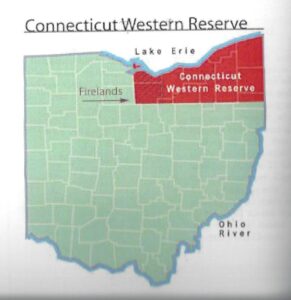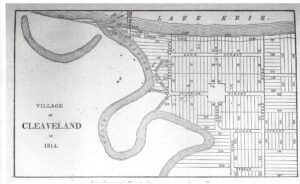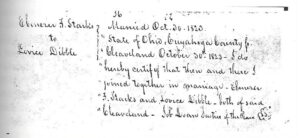My great, great, great-grandfather Ebenezer Fletcher Stark married Lovisa Dibble in 1823. The Dibble family, originally from Aurelius, New York, had first settled in 1811 in Frenchtown, Michigan, where the River Raisin empties into Lake Erie. They had just established their farm, 75-acres purchased with $175 they had received from selling their property in New York.
However, the timing was unfortunate because the British, waging war to protect its dominance of the Atlantic and expand its interest in Canada and the fertile lands of the Ohio Valley was engaged in aggressive action against the settlers in those areas. The Indian tribes of that territory, starved by harsh weather conditions, were willing to cede their lands to the British in exchange for food and firearms and sided with the British in what became known as the War of 1812. Prominent Shawnee tribesmen such as Tecumseh and Tenskwatawa–known as the Prophet–were active in the British ranks.
Frenchtown, Michigan was less than 40-miles from Detroit. On Sunday, November 15, 1812, Elisha Dibble and his son, Samuel—the oldest of nine children—were working in their fields when their neighbor, Jonathan Kent, galloped up on his mare breathlessly announcing, “They’re coming! A raiding party of British soldiers and Shawnee Indians have stormed Detroit burning and killing and are now headed in this direction, two hours away. We must flee. We’ll take my yawl down on the river. Fetch your family, Elisha, and bring only enough food and belongings for three or four days. Make haste, we must leave immediately.”
Elisha, his wife Phoebe, and eight of their children, Lavina, Polly, Hosea, Martin, Anson, Lovisa, Lewis, and Lyman went aboard the Kent’s 24-foot yawl. Their Son Samuel had ridden ahead on horseback to find and join the Ohio militia. The Kent’s only had a family of three, but the small boat was terribly overloaded. They sailed along the western edge of Lake Erie heading for the Western Reserve, a settlement three days away. The breeze was only moderate, yet the Lake was covered with whitecaps splashing over the low gunnels of the yawl. The children were kept busy sopping up the water with rags, wringing them out over the side. Sails were reduced to keep the boat from capsizing but maintaining a fair speed was essential. The escapees made good distance that first day and went ashore for the night at the abandoned British fort at Sandusky. They were a third of the way to their destination.

The next two days on the lake was not as rough, allowing the families to contemplate their futures. Would they ever return to reclaim their belongings so hastily left behind? Would their homes be burned by the enemy? How could they be expected to start over again, this time with nothing more than the clothes on their backs? On the other hand, would the Western Reserve be a similar rich, productive paradise as their River Raisin farmland? Eight-year-old Lovisa tried to encourage her nine-year-old brother Lewis saying, “We’re on another great adventure, Lewis. Who knows, maybe our new home will be even more beautiful and exciting than the one we just left.”
On the third day the yawl turned into at the mouth of the Cuyahoga River. A sandbar had formed near the mouth causing waters to be blocked and spoiling along the shoreline. Cautiously creeping up the river to avoid running aground, the stagnant river conditions caused a putrid stench to fill the air. Eventually a few cabins appeared on the surrounding riverbank, but nowhere could be seen fields of wheat, corn, or other crops. The travelers were stunned by the bleak scene.
Kent was securing the yawl to a pier along the bank when a man approached. “Welcome strangers, to our village. Lorenzo Carter be my name. Where you from?”
Elisha Dibble handled the introductions, explained their escape from the British at the River Raisin, and asked about the village.
“Do not judge our settlement by the look of this riverbank,” Carter replied. “We have over 100 persons now settled in the village and one of them is a doctor. It’s true, the stagnant condition of the river has caused many of my brothers and sisters to move away from the river into the Euclid and Superior sections. There you will find populated neighborhoods. There is a blacksmith shop, a grain mill, and a store of sorts—when produce is available to purchase or barter.

The Dibbles and Kents acknowledged the ballyhoo but were a bit skeptical. Borrowing tools and implements, the Dibbles and the Kents built cabins in an area known as Doan’s Corners. Elisha Dibble turned support of his family over to his oldest son, Samuel, and joined the Ohio Militia to fight the British. Tragically, during the war, Elisha became ill with an undiagnosed malady and died.
By 1814, the Dibbles had settled themselves. Lovisa was now 10-years old and her brother Lewis, 11. This was the year the Starks arrived from Connecticut. Eben although 16 and a newcomer, became like a pied piper to the younger children who followed him everywhere.
It was this friendship that later in 1823 led to Eben and Lovisa’s marriage and Lewis and Eben becoming best friends and Great Lakes ship captains. Both men became prominent Cleveland landowners and two Cleveland streets bore their names. Stark Avenue disappeared in later development, but Dibble Avenue is still a main throughfare in the city.

A few of the events discovered during my research when writing the book, Great Lakes Skipper included accounts of disastrous Great Lakes storms, a worldwide Cholera epidemic, the disgraceful Black Laws, involvement in the Underground Railroad, the Depression of 1837, the ghastly practice of early heroic medicine, and heroic details of Ebenezer’s tragic death in 1844.
What a fascinating and proud ancestral history.
Great story Jim. Keep ’em coming.
Jim, very good. We now seem to be back on track. Thanks for the interesting info.
Fascinating. I now want to reread my copy of your book. My life seems so boring when you hear of what our ancestors went through!
That sets the stage nicely for Great Lakes Skipper. Well done. ~pfa